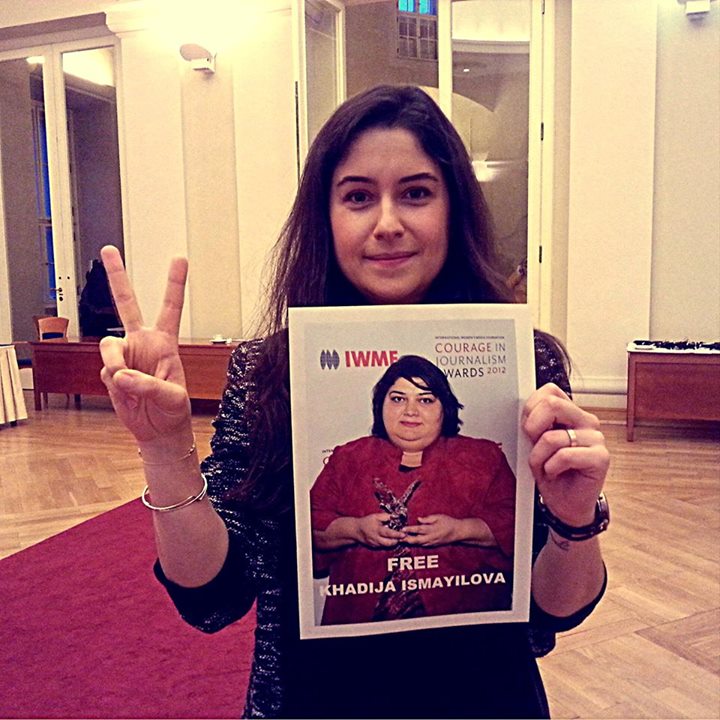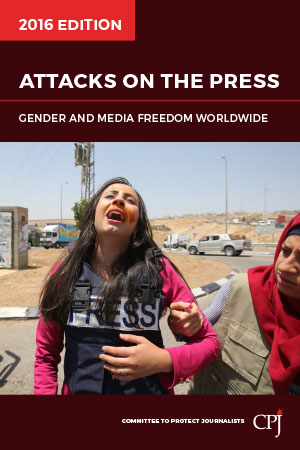It feels strange to be writing about friends in jail. You wonder what kind of a friend you are–free to breathe the air, to walk the streets, to continue to work, while your friends cannot. Why do you deserve this privilege?
But such is the state of freedom in Azerbaijan, where innocent men and women-especially journalists and human rights activists–are thrown into jail on trumped up charges, for lengthy periods, because they attempted to report the truth. None of my friends in jail–and sadly, I have a few–are criminals. They are brave people who spoke the truth and confronted the government. They worked tirelessly to make Azerbaijan a better place.
One of them is Khadija Ismayilova (sometimes written Ismayil), a well-known investigative journalist who also hosted a daily radio show called “After work” on Radio Azadliq the Azeri service of the U.S. government-funded Radio Free Europe/Radio Liberty, which was among several international organizations shut down by the government in 2014 For a brief time, she was also the station’s bureau chief in Baku, and for three years she was a key member of the Organized Crime and Corruption Reporting Project, which exposed fraud by the family of Azerbaijani President Ilham Aliyev and other government officials.
Aliyev was elected president in 2003, succeeding his father, former KGB General Heydar Aliyev. The transition was swift and seamless in a country with a poor record of free and fair elections. In what many international observers described as a flawed election, Ilham Aliyev won an absolute majority with 75.3 percent of the vote. In 2009, after two terms in power, the younger Aliyev managed to scrap presidential term limits through a national referendum and in 2013 was elected to a third term with 84 percent of the vote.

Starting in 2010, Khadija Ismayilova detailed corruption in the highest echelons of Azerbaijan’s ruling establishment, especially among the Aliyevs, from lucrative business deals awarded to companies connected to the president’s family to the workings of offshore companies and properties owned by family members, including the president’s teenaged son, Heydar Aliyev, who was named after his grandfather.
In her first big investigative piece, Ismayilova reported on the Aliyevs’ connections to AZAL, or Azerbaijan Airlines, which had bypassed the government’s State Committee on Privatization of State Property to privatize its service branches. She also reported that the ruling family was personally benefiting from the construction of the Crystal Hall concert venue, built to host the Eurovision Song Contest in 2012, and had acquired full rights to a lucrative gold field exploration. In 2014, she reported on connections between the Aliyev daughters Arzu and Leyla and the country’s largest telephone company, Azercell. Neither the government nor the president and his family have denied these allegations nor otherwise responded to the stories.
The ruling family is known for guarding its privacy, with the exception of appearances at glitzy galas where journalists asking tough questions are not welcome. Privacy, however, was not a luxury extended to Ismayilova once she had angered powerful people with her investigative reporting. Attempts to silence her included a March 2012 online posting of a sex tape involving her, which she said followed a letter she had received with intimate photographs and the threat: “Whore, behave. Or you will be defamed.” Envelopes containing the same photos were also sent to her boyfriend, relatives and opposition media outlets, she said.
The release of a sex tape could be particularly damaging to a woman in a conservative, Muslim-majority country, with all the potential ramifications, including the possibility of an honor killing, according to traditional Azerbaijani customs, said Giorgi Gogia of Human Rights Watch during a ceremony that awarded Ismayilova the organization’s Alison Des Forges Award for Extraordinary Activism in 2015.
In Azerbaijan, gender-related attacks are among many mechanisms used in attempts to silence critical media, and they are not limited to women. Men, too, have been the targets of sexual revelations. In many cases, such attacks are precursors to imprisonment. Sometimes, the harassment extends to journalists’ relatives, forcing some to leave their jobs or feel compelled to denounce family members for the work they do.
Although other journalists, both male and female, have been harassed, Ismayilova is the first female journalist to be imprisoned. She was first arrested in December 2014 on charges of inciting a man to commit suicide-a charge widely criticized by human rights organizations as bogus, for which she was later cleared. While she was in pretrial custody, she was charged with several alleged crimes, including embezzlement and tax evasion, and on those she was convicted. On September 1, 2015, she was sentenced to seven and a half years in prison.
As this was happening, the government increased its use of ruthless tactics against women and elder journalists and activists, both groups traditionally treated with respect in Azerbaijan. In a span of six months in 2014, while Azerbaijan held the chairmanship of the Committee of Ministers of the Council of Europe, conditions deteriorated for independent media outlets, nongovernmental organizations, youth activist organizations and opposition groups. As more restrictive laws were introduced, some civil society organizations suspended their activities, prominent rights defenders were detained, travel bans were selectively imposed and many organizations’ bank accounts-as well as those of individuals associated with them–were frozen.
In August 2015, two prominent Azerbaijani activists, Leyla Yunus and her husband Arif Yunus, were jailed on charges similar to those imposed on Ismayilova. They received terms of eight and a half years and seven years, respectively, the BBC reported. Leyla Yunus is an outspoken and fierce critic of Aliyev and a supporter of reconciliation initiatives between Azerbaijan and Armenia, which were embroiled in a territorial dispute between 1988 and 1994. A fragile woman of 60, Leyla Yunus has lost a significant amount of weight, and is suffering from a number of health issues, according to her lawyer.
And then there is my story-an ugly campaign to discredit me in the eyes of the Azerbaijani people. There were TV shows debating whether I committed treason by promoting reconciliation with Armenia and some local media outlets labeled me an Armenian spy and said I was working to discredit Aliyev’s government while writing in Armenian for a Turkish-Armenian news outlet. Actually, I was an Azerbaijani journalist and commentator, writing occasionally, (in fact, in Turkish), about Azerbaijan-related news and events, for a Turkish-Armenian newspaper, AGOS, based in Istanbul.
Like Ismayilova, I was labeled a whore by some pro-government journalists and members of a pro-government youth movement known as IRELI, who likewise characterized my mother as a whore who gave birth to a whore. Even my late father was used in a campaign to silence me: In a cartoon that circulated on social media networks, I was depicted in the arms of the Armenian president, alongside a caricature of my father at his own grave with his hand held over his face in shame. On Facebook, people commented by the thousands under pictures with fake descriptions of me, with many users talking about raping me in unimaginable ways, hanging me, and punishing me for the crimes I had allegedly committed.
Similar to the sex tape in Ismayilova’s case, and the treason accusations in the case of Leyla Yunus, I had to be discredited first before I would receive my public chastisement in the form of allegations of treason and photos of me posted online with captions that read “traitor.”
Among the male journalists who have been similarly targeted are Ganimat Zahid and Azer Akhmedov, respectively the editor and the director of the newspaper Azadlig, according to Human Rights House, an international group, which also noted that another male journalist was “implicated as having had a homosexual partner in an attempt to harass him.”
Given the behavior of the government and individuals and groups operating on its behalf, Ismayilova was aware that her work would likely result in grave personal consequences. Though the government was never linked, some enterprising journalists had paid with their lives. In 2005, Elmar Huseynov, the editor-in-chief of a local magazine that was exposing corruption of the Azerbaijan government, was shot to death on his way home from work in Baku. In 2011, another journalist, Rafig Tagi, was stabbed to death outside his home. In 2015, reporter Rasim Aliyev died in a hospital following a severe beating. In Aliyev’s case, the alleged perpetrators have been identified, but none of the other cases have been solved. Years after Huseynov’s murder, Ismayilova said in an interview for the film “Amazing Azerbaijan!” that she felt some responsibility. “He was doing it alone… We all were doing this easy journalism, and he was doing the uncovering,” she said.
Given the longstanding attacks on the press in Azerbaijan, Ismayilovasaid she was disturbed but not surprised when she received the package containing the intimate photos and threat. In response, she decided to go public, which she said was not an easy decision given the inevitable public shaming that would follow. Remarkably, many Azerbaijanis, including some in the country’s religious community, defended her, and Ismayilova continued her hard-nosed reporting-until the government played its trump card and imprisoned her.
Though I have not been in direct contact with Ismayilova since then, we communicate through her mother, who sees her in prison, and mutual friends.
Ismayilova is fond of repeating a Vaclav Havel quote that says a life is not worth living that does not involve willingness to sacrifice itself for the sake of values, and she has adhered to that dictum. But it has cost her dearly. And even for those of us who continue to work as journalists, what happened to her and to others like her has exacted a massive toll.
Arzu Geybullayeva is a freelance writer based in Istanbul who reports on human rights violations in Azerbaijan.
